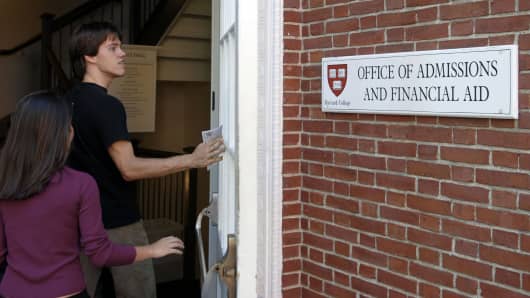1) Explain how you use the college admissions process to improve the nation's intellectual pursuits, as opposed to being a tool for your institution to climb college rankings lists.
The college ranking phenomenon and hysteria are not things the colleges themselves are responsible for starting. But about 35 years ago, U.S. News & World Report kicked off this craze and, sadly, even the most elite institutions decided to play along. I know most schools probably hate this scrutiny, which is sometimes very unfair. Yet as a parent, I'd like to give special preference to those institutions that can prove they are fighting back.
One of the most important metrics in those school rankings are their acceptance and rejection rates. Colleges move up in the rankings if they reject a higher percentage of applicants—giving them not only an incentive to be more selective, but also a reason to compel as many students to apply as possible.
It's kind of a sick game.
However, I know there are schools that see the admissions process as a way to let all students know what they value in education both at the college level and in the earlier years. This is the way it used to be before standardized tests, when competitive colleges gave individual exams that they formulated for applicants.
As a parent, I'm more than ready to break free from the chains of worrying about which schools are ranked higher than others. I hereby invite all colleges in America to join in this emancipation, and explain to students and parents how they have, or intend to, get on board.
2) Explain how you still care more about intellectual diversity than racial and ethnic diversity.
Ethnic and racial diversity is a good goal to pursue. And after more than two centuries of morally corrupt racial policies at American universities, it's important to try to reverse at least some of the effects of those policies.
That said, far too many schools have become satisfied with focusing on raw admissions numbers based on Affirmative Action. We know some schools are dealing with this challenge by cultivating a collegial atmosphere in and outside of the classroom between students of all backgrounds, but so much more needs to be done.
One great example of a better way comes from Israel, where the country's top technical college has a unique approach to diversity. The Technion Institute doesn't wait until students apply to the school to ensure a good balance of Israelis and Arabs in its classrooms. Instead, it sends top students and teachers to Arab villages to instruct and aid young people interested in math and science using "boot camp" style tutoring sessions.
The result is the "MIT of Israel" not only has more Arab students than other Israeli universities; they are there because they were admitted for successfully fulfilling the same admissions requirements as every other student.
I know a lot of American colleges have programs where they offer help and instruction to schools in areas heavily populated by minorities, and I admire that. But if any of them pursued a similar path as the Technion, they'd likely go right to the top of my list of potential schools for my daughter. That would be a school that proves that education for all, and not virtue-signaling statistics, was the most important priority.
3) Prove you're charging a fair tuition price, and not just as much as you can get away with.
The biggest reason college tuition prices have consistently shot up more than inflation, is because they can. Schools know that federally-backed student loans have no effective caps: As long as the prospective student and her parents are willing to take on massive loans, the sky's the limit. There are some facts that work in the favor of academic institutions:
First, we know that colleges are facing rising costs of their own at a time when state schools may be seeing their level of state aid being cut. So feel free to show us your real balance sheet —as long as you include endowment numbers, donations, and the relative benefits of your tax-free status.
Second, some of the richest schools have effectively made college tuition free for even some middle class families. If you have financial aid programs that outpace annual increases in tuition, make sure to list them.
Then there are school-supported internships. Most colleges now encourage internship experience by giving students who work on internships class credit. Many of them even forego making the students pay the usual fees for those credits as well. It's something we take for granted now, but it was simply not the case decades ago at any school.
The most logical answer to this question is for a school that wants my daughter to attend to show how it's being responsible about its costs, and demonstrate it is truly weighing the financial hardships that go along with financing a college education.
There is an oft-repeated meme that, even at these ever-rising prices, college graduates do better in the long run economically than non-college grads. It's something institutions use to justify higher prices, but the argument itself is a misdirection.
There's no way of proving that their economic success wouldn't be the same or better if parents simply gave their kids hundreds of thousands of dollars in loans at age 18, and see how they fared going forward. Plus, is it the college education that helps people do better economically in the long run, or the fact that they were born with built-in advantages (intellect, wealth, etc)?
4) If my child can't hack college work, will you let them fail?
This is kind of a trick question that I'm hoping colleges will answer as "yes." Despite what you've heard about the rise of "helicopter parenting," I'm from the camp that says letting kids skate by does them a lot more harm than good.
No one wants to see their child flunk out of school. But if my daughter isn't able or isn't willing to do enough to pass a course of study, that's exactly what should happen. It will be a tough lesson, but one that she can learn and ultimately benefit from at such a young age.
The same goes for the rise of "safe-spaces," where universities are literally setting up locations where opinions and speech that's uncomfortable for students gets banned. That's pretty much the opposite of what college is supposed to be about, and simply not what anyone should be looking for in their educational institution.
I suspect a lot of the hysteria over safe spaces and grade inflation is unsubstantiated in most cases. Regardless, don't coddle my child.
I remember I learned a lot in my college classrooms, but I learned just as much or more by being out on my own and having to take on adult responsibilities. No school should steal that learning experience from its students in the name of "safety" or "comfort."
Again, all colleges interested in my daughter as a student, and her family's money to go along with her, have four years to answer the above questions. That's all we ask.
We look forward to choosing the best school for our daughter to join the class of 2025!
Commentary by Jake Novak, CNBC.com senior columnist. Follow him on Twitter @jakejakeny.
For more insight from CNBC contributors, follow @CNBCopinion on Twitter.




